‘Profoundly shameful’: Britain’s anti-asylum bill sparks massive outcry
By Reza Javadi
In a controversial move smacking of disregard for human rights, the UK House of Lords has approved an anti-asylum bill, sparking massive anger and outrage from civil rights groups.
The bill, which experts say is grossly inconsistent with the country’s obligations under international law, prevents migrants from claiming refugee protection or other human rights, regardless of their situation.
After winning votes in the House of Lords, the Illegal Migration Bill (IMB) is set to become law in the United Kingdom, enabling the Home Office to detain and remove anyone entering the country for seeking asylum. They could also be transported to Rwanda or a third country under the plan.
The controversial Rwanda plan was ruled unlawful by the Court of Appeal last month, although British Prime Minister Rishi Sunak is seeking permission to appeal against the decision at the Supreme Court.
The United Kingdom struck an initial 140 million pound agreement with the East African country last year, but the plan has been stuck in the courts.
The policy to remove anyone who comes to the UK by boat applies to victims of trafficking and slavery, accompanied children, and unaccompanied children as soon as they turn 18.
Former British Prime Minister Theresa May has said the bill "will enable more slave drivers to operate and make money out of human misery."
Concerns over controversial legislation
Following the approval of the bill, the United Nations released a critical statement, slamming the new legislation and warning that it is against international law and puts the lives of refugees in danger.
In a joint statement, the UN human rights chief Volker Turk and the UN refugees head Filippo Grandi said the bill "will have profound consequences for people in need of international protection."
"This new legislation significantly erodes the legal framework that has protected so many, exposing refugees to grave risks in breach of international law," Grandi said, as reported by the UNHRC.
It gives permission to British authorities to remove asylum seekers, regardless of whether they are at risk of persecution, have suffered human rights violations, or are survivors of human trafficking.
“Carrying out removals under these circumstances is contrary to prohibitions of refoulement and collective expulsions, rights to due process, to family and private life, and the principle of best interests of children concerned,” Turk said, urging London to reverse the move.
“I urge the UK Government to renew this commitment to human rights by reversing this law and ensuring that the rights of all migrants, refugees, and asylum-seekers are respected, protected, and fulfilled, without discrimination,” he stressed, as cited by the OCHA.
He further said that the bill's passage raises "very serious legal concerns" and sets "a worrying precedent for dismantling asylum-related obligations" that other countries may follow.
Vicky Tennant, UNHCR's representative to the UK, said the bill “effectively extinguishes the right to claim asylum in the UK for the vast majority of people coming here in search of protection.”
“It has overturned a long-standing humanitarian tradition, but more importantly it is not in line with the refugee convention, predicated on the right to put forward a claim for asylum and have that claim examined,” he was quoted as saying by BBC.
UN refugee and human rights experts say the Illegal Immigration Bill is set to exacerbate the already vulnerable situation of refugees across the UK.
Condemning the conservatives’ plan, Labour's shadow immigration minister Stephen Kinnock said the government's response to the latest proposals from peers was “typically arrogant and tin-eared” and “ministers are refusing to listen”.
“They are once again closing their eyes and ears to the reality of what is happening around them and continuing to drive the car straight into a brick wall,” he said, as cited by the Sky News.
Bridget Young, NACCOM’s director, in a statement said the passing of the bill “marks a profoundly shameful and damaging moment for refugee protection and human rights in the UK.”
“The many failures and harmful impacts of the Bill have been explained clearly and in detail to the Government again and again – including by NACCOM and our members,” she said.
“We are devastated that they continue to willfully ignore all evidence and guidance, and choose criminalization and cruelty over compassion and competence. “
Bibby Stockholm barge a “floating prison”
Concurrent with the controversial bill’s approval by the House of Lords, an accommodation barge arrived last week in Portland Port, Dorset, where it is due to house 500 asylum seekers, twice the number of people it had been designed to accommodate.
Protests greeted the Bibby Stockholm, described as a “floating prison”, as it entered the harbor. The first asylum seekers are due to arrive on the barge within two weeks, according to Downing Street.
Three-storied vessel the size of a football pitch, Bibby Stockholm has spent the last 30 years as an accommodation barge for homeless people and construction teams working off the Scottish coast.
“Yesterday I wrote to the home secretary and the transport minister to say I'm not confident the safety of this barge has been properly assessed to accommodate twice the number of people on it that it was designed for,” said local MP Chris Loder, who was at the dockside as the Bibby Stockholm.
“There are a lot of questions that are unanswered, and quite a few concerns... people don't understand why there are 500 single young men intended to be on that barge,” he was cited as saying by the BBC.
Meanwhile, the government has not confined its unpopular asylum accommodation policy to the barges and has introduced four other sites, including military bases, for housing the refugees.
Back in March, the government confirmed three ex-military bases in Essex, Lincolnshire, and East Sussex to be used for housing asylum-seekers.
The inhumane accommodation plan, which is an attempt to reduce the cost of hotels and put lives at critical risk, has drawn strong condemnation from different groups and organizations worldwide.
Shadow home secretary Yvette Cooper has depicted the use of barges as "a sign of the Conservatives' total failure to clear the asylum backlog... or get any kind of grip on the system".
Delivering a speech in Westminster on Monday, Cooper called the new IMB law “a con which will only make the Tories' asylum chaos worse.”
The Tories are being heavily criticized due to their failed policies, which have wrecked the fabric of the UK reputation both economically and politically worldwide.
A recent poll by YouGov shows unprecedented dissatisfaction with Prime Minister Sunak, revealing his rapidly falling favorability rating, reaching its lowest level to date: -40, down from -34 in late June.
According to YouGov’s favorability tracker, around 65 percent of Britons have an unfavorable view of the prime minister, partly due to conservatives’ deteriorating policies.
More than 45700 people were detected arriving by small boats in 2022, 60 percent higher than in 2021, according to official figures by the government. In spite of protests and concerns over the anti-refugee plan, the government cites its new bill as a roadblock for illegal passages from the English Channel.
VIDEO | Thousands evacuated in Ethiopia amid earthquakes, volcanic eruption fears
Revealed: Israeli ministers eye restoration of illegal settlements in Gaza through genocide
How Los Angeles’ pistachio tycoons facilitated and profited from wildfires
Iraqi PM: Iran was in Syria to fight terrorism; presence requested by Damascus
Hamas: Israel's massacre in Jenin camp won’t break resistance
60 bodies recovered from abandoned South African gold mine: Police
Biden administration ‘quietly’ circumnavigating own ban on TikTok: Report
Iran Navy takes delivery of first advanced ‘signals-intelligence’ destroyer


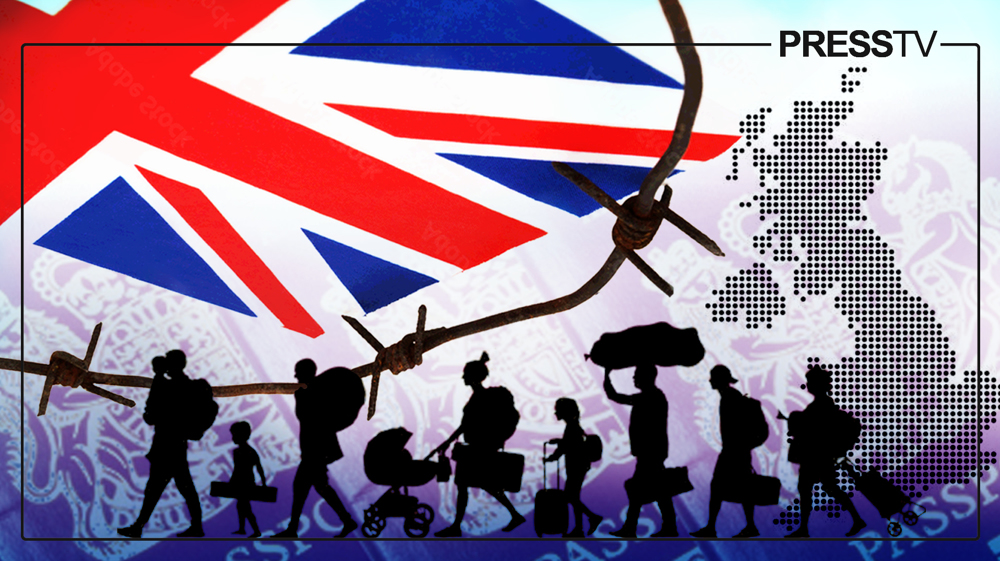
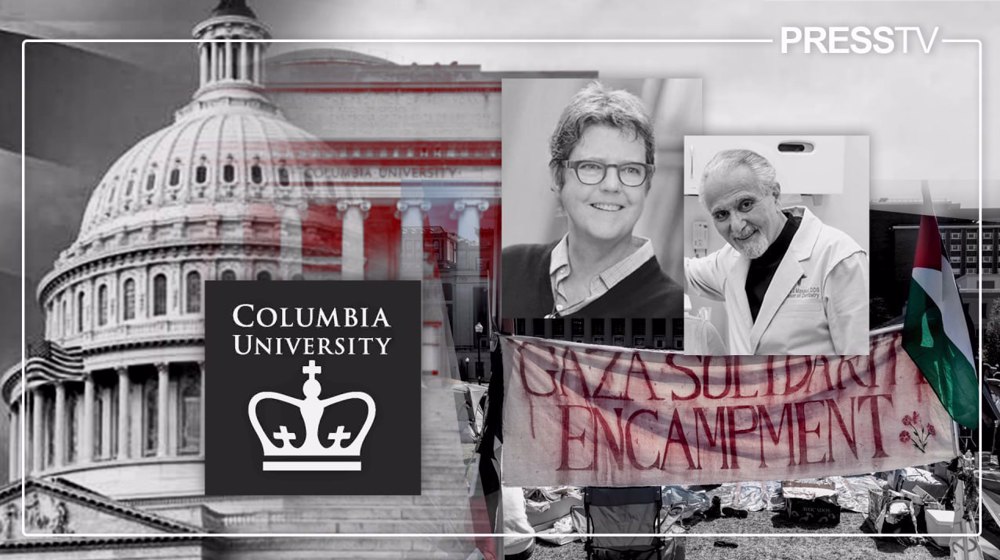






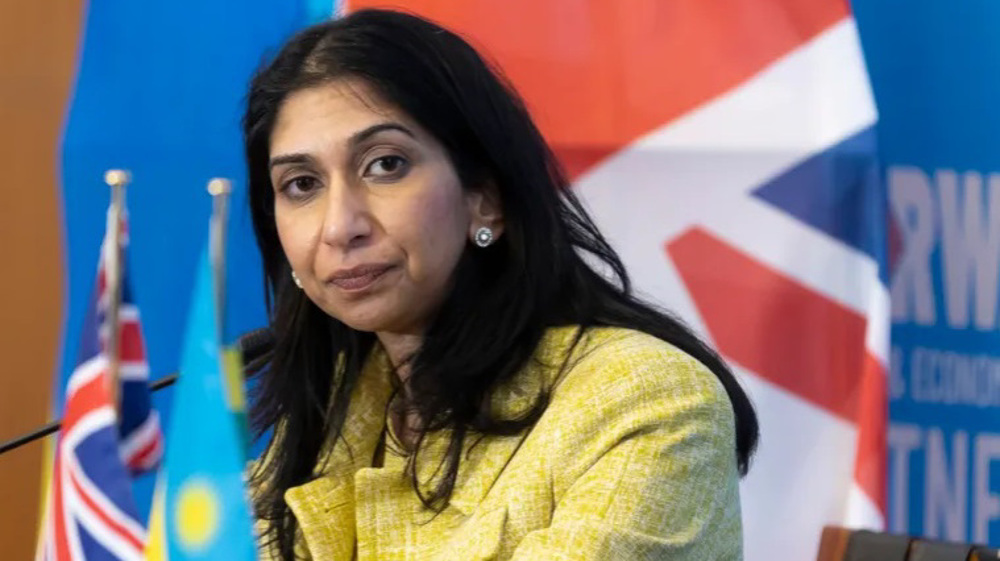
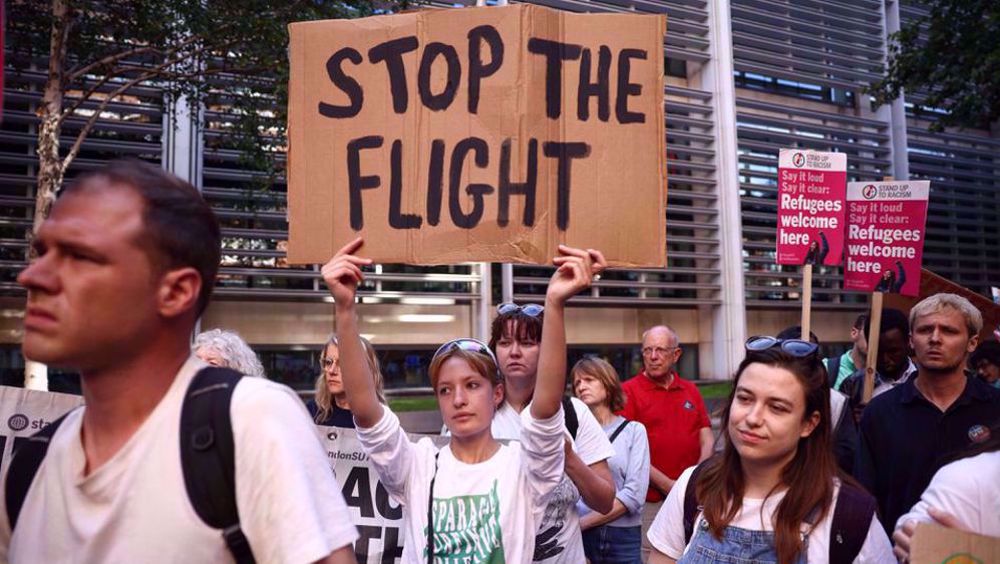

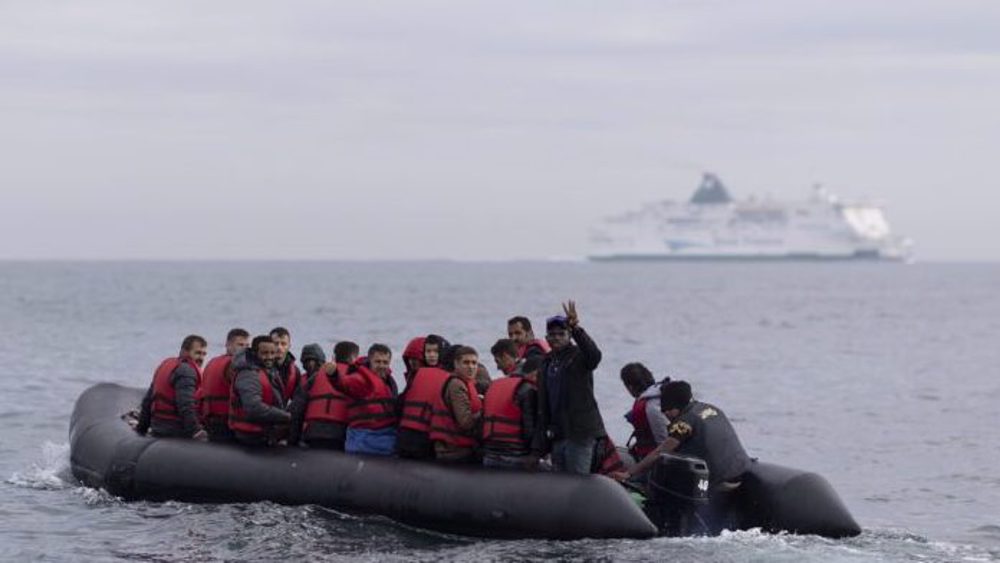

 This makes it easy to access the Press TV website
This makes it easy to access the Press TV website